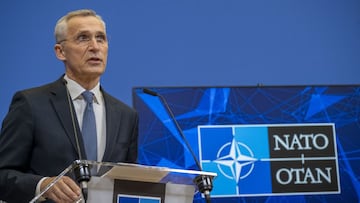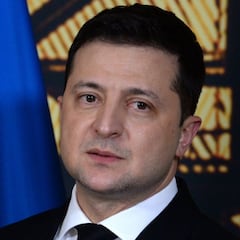NATO will send more troops to Eastern Europe in response to Russian attack on Kyiv
Russia's military continues to bombard Ukraine and Western powers have agreed to move the NRF to NATO nations in the east to deter President Putin.


NATO has confirmed that it will be making “significant additional defensive deployments of forces” to Eastern Europe to bolster the alliance’s defences against the threat of further Russian expansion.
The statement came after a virtual summit of all 30 NATO leaders on Friday in response to continued Russian aggression in Ukraine, which has targeted the capital city of Kyiv repeatedly.
Secretary-General Jens Stoltenberg described the situation unfolding as "the gravest threat to Euro-Atlantic security in decades”.
BRUSSELS (AP) -- NATO chief says leaders agree to send rapid response troops to protect allies near Russia and Ukraine.
— Kyle Griffin (@kylegriffin1) February 25, 2022
The statement read: "Russia has shattered peace in Europe. The people of Ukraine are fighting for their freedom in the face of Russia's unprovoked invasion. We deplore the tragic loss of life, enormous human suffering and destruction."
“President Putin’s decision to attack Ukraine is a terrible strategic mistake, for which Russia will pay a severe price, both economically and politically, for years to come.”
However while there is a desire to support Ukrainians in the face of a powerful adversary, Ukraine is not a fully-fledged member of NATO and so not protected by the alliance’s military might. Troops will instead be sent to neighbouring countries and supplies and armaments sent to Ukraine’s military.
Follow all the latest breaking news here...
- Russian forces attack Kyiv: live updates
- Russian forces take control of area surrounding Chernobyl nuclear power plant
- Anonymous declares war against Russia: starting a cyber war
Where will NATO troops be sent in Eastern Europe?
The statement released on Friday did not outline exactly where the additional troops will be sent but did make clear that they will go to NATO countries in the region.
On Thursday, Stoltenberg confirmed that NATO would provide more troops, telling a press conference in Brussels: "There will be more forces in the east of the alliance.”
The troops in question will come from the NATO Response Force (NRF), which is a multinational force comprised of troops, vehicles and equipment from the constituent nations to be used in conflicts all around the world.
We are deploying elements of the #NATO Response Force.
— NATO (@NATO) February 25, 2022
Here are 5️⃣ things you should know about the highly ready, multinational force pic.twitter.com/abdWkNAtqg
He refused to give specifics which parts of the 5,000-strong multinational force would be moved to Eastern Europe to act as a deterrent against Russia. In recent years troops from the United States, United Kingdom and Germany, amongst other NATO nations, have been stationed in the Baltic and Black Sea.
Related stories
The latest wave of troop movements will also see hundreds of fighter planes and warships placed on high alert "from the Barents Sea to the Mediterranean," Stoltenberg confirmed.
"As long as Russia knows that an attack on a NATO ally will trigger a response from the whole alliance they will not attack because we are the strongest alliance in history," Stoltenberg said on Thursday. "That's the best way to prevent spillover from the tragedy, the heinous attack we see on Ukraine.”

